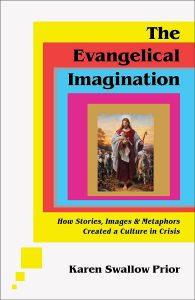The allure of empire is so deeply baked into evangelical culture that it is expressed in compulsive and sometimes unconscious ways, author and scholar Karen Swallow Prior said.
“We have this empire mentality,” Prior said during a Sept. 18 webinar hosted by the Baptist Studies Center at Abilene Christian University. “We don’t go out and conquer lands and people anymore — I hope — but we have inherited this idea of empire, this idea of rescuing others and imposing ourselves and our understandings on other people. And we grow publishing empires and preaching empires and conference empires and educational empires.”

Karen Swallow Prior
The online discussion focused on Prior’s newest book, The Evangelical Imagination: How Stories, Images, and Metaphors Created a Culture in Crisis. Myles Werntz, director of the Baptist Studies Center, moderated the event.
Prior is no stranger to faith-based crises. Earlier this year, she resigned her professorship in English and Christianity at Southeastern Baptist Theological Seminary after tweeting that it had become clear “that the institution and I do not share the same vision for carrying out the Great Commission. It has also become clear to me that I am simply not well-suited to the politics of institutional life in the SBC.”
However, Prior was adamant that her new book is not an attack on evangelicals but “a critique done in love” and “an attempt to understand and maybe to correct the course of the movement. I have considered myself an evangelical for a long time.”
The Evangelical Imagination traces the development of evangelicalism from its beginnings in 18th and 19th century England to illuminate how positive and negative aspects of the Victorian age, the industrial revolution and colonialism shaped the values of what was then an emerging, modern Christian movement.
“I am trying to give the good and the bad, like how something started out good and maybe went astray.”
That mixture of capitalist and expansionist influences eventually gave rise to Manifest Destiny, an empire-building concept embraced and shaped by evangelicals to conquer the American continent and its inhabitants, she said. “The chapter on empire was hard to write. In this book, I am trying to give the good and the bad, like how something started out good and maybe went astray. I don’t think building empires was ever good.”
The Victorian era, on the other hand, had numerous positive influences on evangelicalism, Prior said. “There’s so much good in that age, like social reform, the abolition of slavery and labor laws that were protective of women and children.”
But the rise of the middle class during this period “led to more materialism and to the idea of the separate spheres for men and women, and the idea that a man’s success could be symbolized by his wife staying home, and women just being relegated to the domestic sphere rather than working as they had for so many centuries. So, the Victorian age has these aspects of progress and improvement, but also some entrenchment of very conservative ideas that have foundation in the Bible but became wildly distorted and mistaken for the Bible.”
The evangelical emphasis on conversion also has its strengths and weaknesses, Prior said. “I do believe in conversion. I do believe the idea of an individual being converted, being born again, being saved — whatever words you might use.”
Again, the value developed early in the movement’s history as its adherents sought to have the experience of Christ they considered missing in the state church of England. “If you were born an English citizen at that time, you were by default a Christian and you didn’t necessarily have that conversion experience.”
“We have a history of emphasizing conversion so much we’ve lost the flip side of the coin.”
But the role of conversion has been over-emphasized since then, Prior said. “Evangelicals emphasize conversion so much that we have to count the number of hands raised or the number of people who come forward, fill the stadium, filled out cards or made decisions for Jesus. We like to count all those and accumulate as many as we can. And we do that so much that we have underemphasized discipleship and sanctification and things that are not as easily measured. We have a history of emphasizing conversion so much we’ve lost the flip side of the coin.”
 Even the word “evangelical” is coming under scrutiny, she added. “That’s a highly contested term now. It has been, for the past several years, a political term and a polling category. For many of us it’s sort of disorienting because it’s become associated with other things. And that leaves many of us wondering, what is it? Do we want to go by that term? Has the term outlived its usefulness?”
Even the word “evangelical” is coming under scrutiny, she added. “That’s a highly contested term now. It has been, for the past several years, a political term and a polling category. For many of us it’s sort of disorienting because it’s become associated with other things. And that leaves many of us wondering, what is it? Do we want to go by that term? Has the term outlived its usefulness?”
At least for the moment, Prior said she will continue labeling herself as an evangelical. “I think historians down the road will determine if some other movement is emerging at this time that has some other name. If that happens before I’m gone, then I will happily embrace the term.”
In the meantime, Prior said she hopes evangelicals will come to understand that some of the beliefs and practices they hold dear may have derived from nonbiblical worldviews and ideas.
“I’m just saying we need to look honestly at how much of our movement is a part of larger cultural forces, including capitalism,” she said. “That’s the water we swim in as human beings living in this time, in this moment. And we have to stop and ask, how much are we assimilating into our understanding of faith?”
Related articles:
Karen Swallow Prior to leave Southeastern Seminary
Why I have empathy for Karen Swallow Prior | Analysis by Rick Pidcock
Christian nationalism: How evangelical Christianity became a political religion\ | Analysis by Alexander Lang


